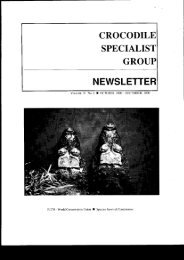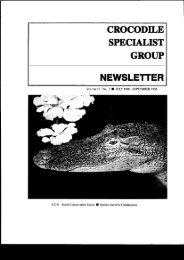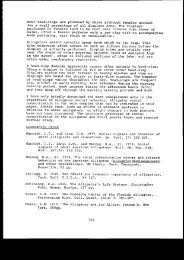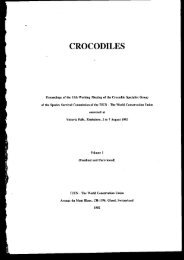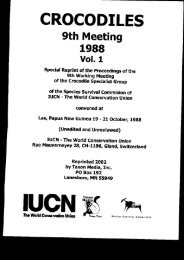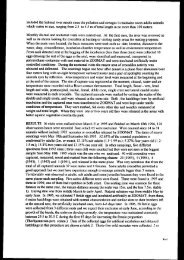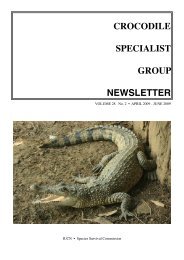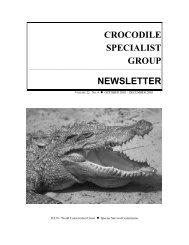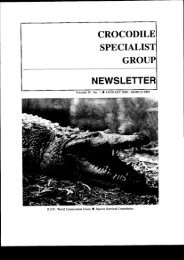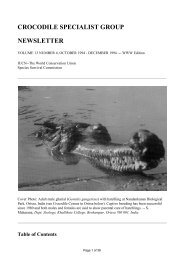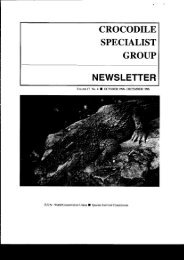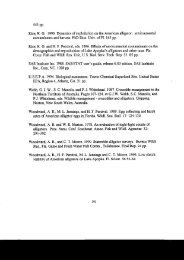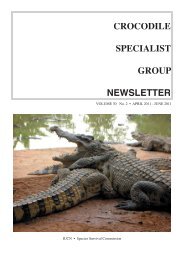size: 5405KB - Crocodile Specialist Group
size: 5405KB - Crocodile Specialist Group
size: 5405KB - Crocodile Specialist Group
You also want an ePaper? Increase the reach of your titles
YUMPU automatically turns print PDFs into web optimized ePapers that Google loves.
<strong>Crocodile</strong> <strong>Specialist</strong> <strong>Group</strong> Steering Committee Meeting<br />
Goldi Sands Hotel, Negombo, Sri Lanka<br />
20 May 2013 (8.30 am-5.00 pm)<br />
Agenda Item SC.2.1<br />
Information Item<br />
South and East Africa Regional Report<br />
Report on Activities:<br />
SOUTH AFRICA<br />
Zululand Nile <strong>Crocodile</strong> Research Program<br />
A workshop was held in Kruger National Park in March 2013, organised by the Zululand Nile<br />
<strong>Crocodile</strong> Research Programme at the University of KwaZulu-Natal. The theme of the workshop<br />
was “Conservation of Nile <strong>Crocodile</strong>s and their Habitat” and the event provided an opportunity to<br />
review progress on research being carried out as well as identify gaps for future research. With 20<br />
attendees, the topics covered included:<br />
• Nile <strong>Crocodile</strong> homing behaviour in the St. Lucia estuarine system<br />
• Changing the approach of Nile crocodile nesting surveys - a template will be drafted and<br />
circulated to workshop participants for comparison with current approach. The high rainfall<br />
experienced during the 2012 breeding/laying period has resulted in a drop in production in<br />
South Africa and there is currently a strong demand for hatchling crocodiles.<br />
• Trichinella zimbabwensis in Nile crocodiles: assessment of predilection patterns and influence<br />
on biochemical parameters<br />
• Ecosystem change and the Olifants River crocodile mass mortality events and pansteatitis in<br />
catfish (consequences of nutrient pollution and man-made hydrodynamic change for the Kruger<br />
National Park)<br />
• Aspects of crocodile health in KwaZulu Natal<br />
• Biology and ecotoxicology of Nile crocodiles in the Olifants River system - Hannes Botha<br />
reports that this project is focusing on contaminant analysis in relation to new work on<br />
lipidomics and has been an official collaboration between the MTPA, MUSC (Medical<br />
University of South Carolina) and SANParks since the end of 2012. A second round of<br />
sampling is scheduled for some time in 2013. In addition, the decline of the Nile crocodile<br />
population in Loskop Dam continues to be monitored (now in its 12th year); Nile crocodile<br />
populations in the Blyderivierspoort Dam, the Flag Boshielo Dam and Manyeleti Main Camp<br />
Dam are also being monitored. Surveys of these populations include population <strong>size</strong>, structure<br />
and distribution. Hannes’s research also includes aerial surveys of the Nile crocodile population<br />
along the entire length of the Olifants River. Further work to study the biology, ecology and<br />
ecotoxicology of the Nile crocodile population in the Manyeleti Game Reserve is planned but<br />
still awaits funding confirmation.<br />
Concern was expressed at the workshop regarding the escape of approximately 15,000 crocodiles<br />
from the Rakwena <strong>Crocodile</strong> Farm into the Limpopo River during flooding in January 2013. Whilst<br />
a recapture operation recovered many of the escapees, more than half of the reptiles are reportedly<br />
still at large (http://www.timeslive.co.za/local/2013/01/24/15-000-crocodiles-on-the-loose-inlimpopo).



